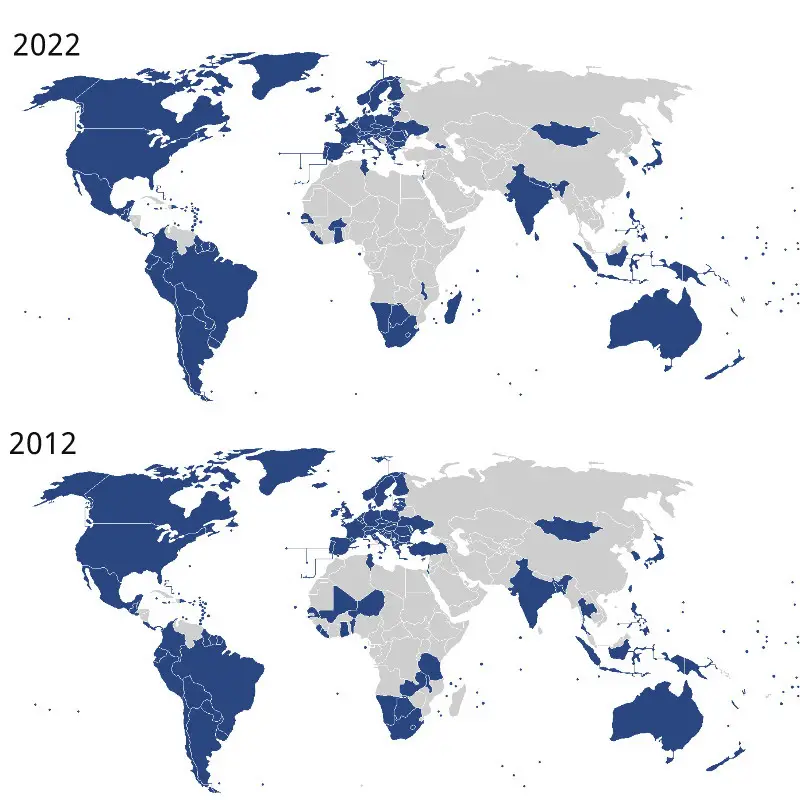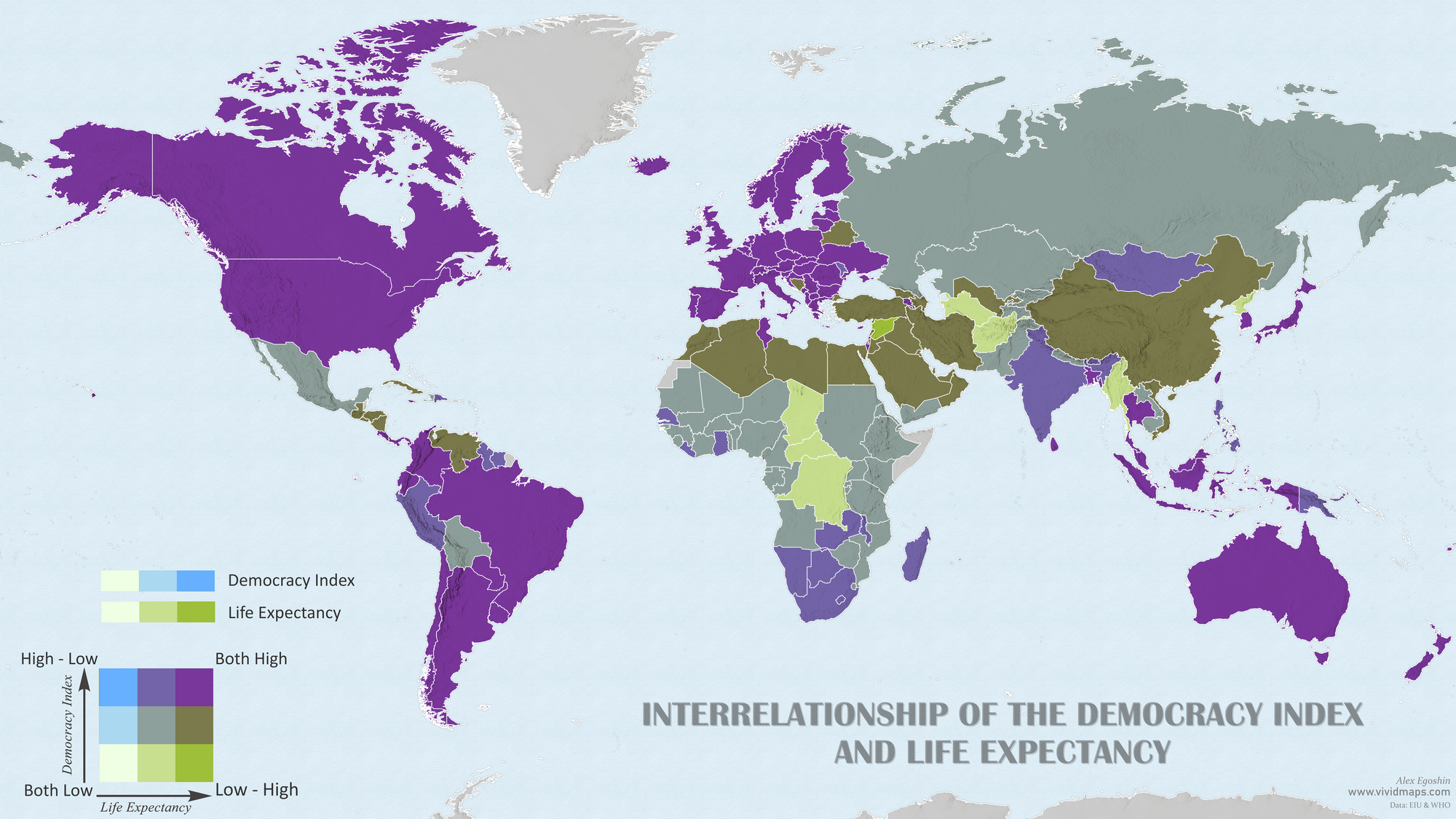Countries considered as electoral democracies by Freedom House in 2012 and 2022
Electoral democracy is a type of representative democracy based on an election, on an electoral vote, as in modern liberal democracies.
Key features of full electoral democracy
- Respect for fundamental human rights
- A multiparty political system paired with political tolerance
- A democratic vote system
- Respect for the rule of law
- Democratic government administration and citizen participation
The map below shows countries considered as electoral democracies by the American organization Freedom House in 2012 and 2022.
Less than half of the world’s nations are democracies nowadays. The ending of WWI directed the birth of multiple democracies. Nevertheless, during the 1930s, many of these immature democracies regressed to being autocratic. After WWII, the number of democratic nations began rising again. But it was, the ending of the Cold War directed to a more fantastic boost in the number of democracies.
The spread of democratic political rights persisted during the early XXIst century.

Overall the level of Democracy utilized by the average global habitant in 2022 is down to 1989 levels. The last 30 years of democratic advancements have now stopped.
Liberal democracies peaked in 2012 with 42 nations and are now down to the most down levels in over 25 years – 34 countries home to just 13% of the world population. The democratic decay is particularly apparent in Asia, the Pacific, Eastern Europe, Central Asia, and parts of Latin America and the Caribbean.
The growing number of closed autocracies – up from 25 to 30 nations with 26% of the global population, while electoral autocracy stays the most typical regime type and holds 44% of the worldwide population or 3.4 billion people.
Early 2022 comes with a record number of countries autocratizing in the last 50 years – 33 nations are home to 36% of the global population holding 2.8 billion people.
The European Union may be fronting its own wave of autocratization. Six out of 27 European Union member states – more than 20 percent of the union – are now autocratizing!
Turkey is still one of the top autocratizers, although it was already ranked as an electoral autocracy by 2013.
In the middle-1990s, the mayor of Istanbul, Recep Erdogan, said, “Democracy is like a tram. You ride it until you arrive at your destination, then you step off.” Erdogan, who is now president of Turkey, has decidedly stepped off the tram.
Why is Democracy in decline worldwide?
According to Larry Diamond, the reasons for the debilitation of global democratic advancement have been several.
- Nothing develops eternally, and the decline of Democracy was virtually unavoidable after freedom and Democracy had spread to exceptional lengths worldwide.
During the 3d Wave of democratization, influential Western democracies, especially the U.S, were devoted to encouraging Democracy and sustaining democratic parties and civil society participants played a significant role in promoting democratic transition and preventing rollbacks of democratic progress. The failure of the American military operation in Iraq gave democracy promotion a bad reputation. It rusted domestic American adherence to it, dominant the liberal democracies (and most consequentially, the U.S.) to devalue democracy promotion in foreign policy and aid. - The economic crisis in 2008 had longer-lingering consequences in some nations, and the lowered pressure on actual revenues of the working and middle classes interacted with longer-term tendencies of economic stagnation and insecurity to make substantial segments of the electorate in the United States and many European nations more sensitive to the attractions of populist, nativist and illiberal alternatives to the established political parties.
- Increasing globalization associated with movements across the borders of people, goods, capital, and services added to the nervousness of many voters who sensed that the sovereignty and safety of their nation were under attack, thus causing an illiberal backlash against immigration and the European Union. This became a more real crisis with the rising immigration pressures from Africa, Syria, and other Middle East countries.
- Social media have proved a fertile soil for polarizing democratic publics, sowing suspicions about Democracy.
- Moreover, according to the researchers of the V-Dem Institute, the Coronavirus pandemic has also had limited forthright impacts on the worldwide downward trend in Democracy. Heads of some nations benefited from the pandemic to further consolidate power.
The consequence of all of this is that we have entered a new era in the world history of a much broader and more noticeable decline of freedom and Democracy.
Mechanisms and Changing Nature of the decline of Democracy
The Democracy Report 2022 indicates that autocratization procedures pass from gradual changes to more forceful evolutions.
According to the Democracy report, a decline in democratization has been noted even in many developed countries due to the strengthening anti-Pruliarist parties and increasing polarization in society.
Anti-pluralist parties push the autocratization in at least 6 of the top 10 autocratizers – Brazil, Hungary, India, Poland, Serbia, and Turkey.
Anti-pluralist parties and their heads lack dedication to the democratic process, discourtesy basic minority rights, encourage demonization of political competitors, and assume political violence. These ruling parties tend to be nationalist-reactionary and have used government authority to move forward with autocratic agendas. In Poland, for instance, the ruling party has ramped up government dominion over the judiciary and the media. Hungary shifted into an electoral autocracy in 2018. In Hungary, Prime Minister Orbán used his power over the press to vilify civil society figures and independent media during the general elections of 2022. Autocratization also involves Slovenia, Croatia, the Czech Republic, and Greece. These trends often coincide with growing polarization.
Polarization reaches an extreme level in 40 countries – contributing to the changing nature of autocratization. In distinction, polarization declined in only six nations.
Campsites of “Us vs. Them” start asking about the moral rightfulness of each other and begin treating opposition as an existential danger to a course of life or a nation. Once political elites and their supporters no longer think that political opponents are legitimate and merit equal respect, democratic rules and ideals can be set aside to “save the nation.”
Autocratic regimes increasingly utilize misinformation to form a domestic and international opinion in their favor. Nation manipulation of statistics and spewing misinformation in media also reveal how political authorities are becoming more proactive in promoting autocratization.







